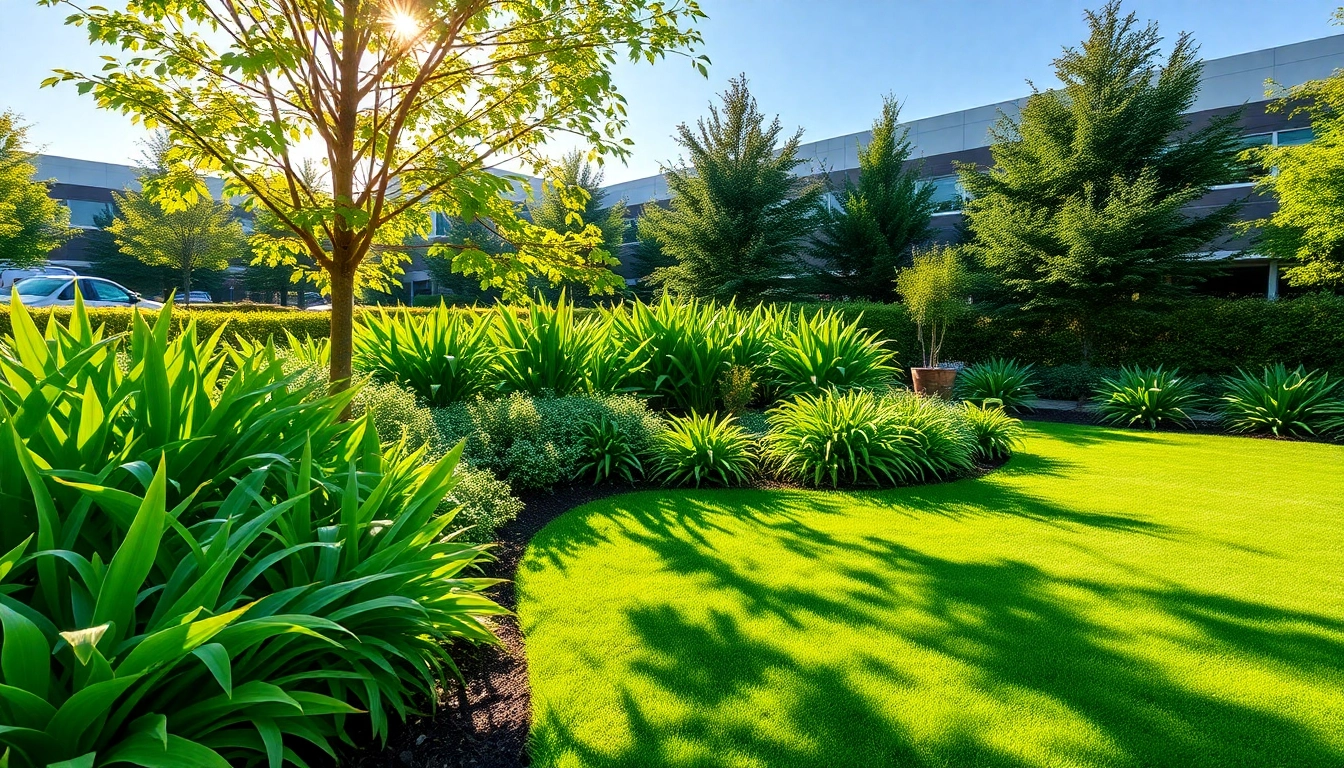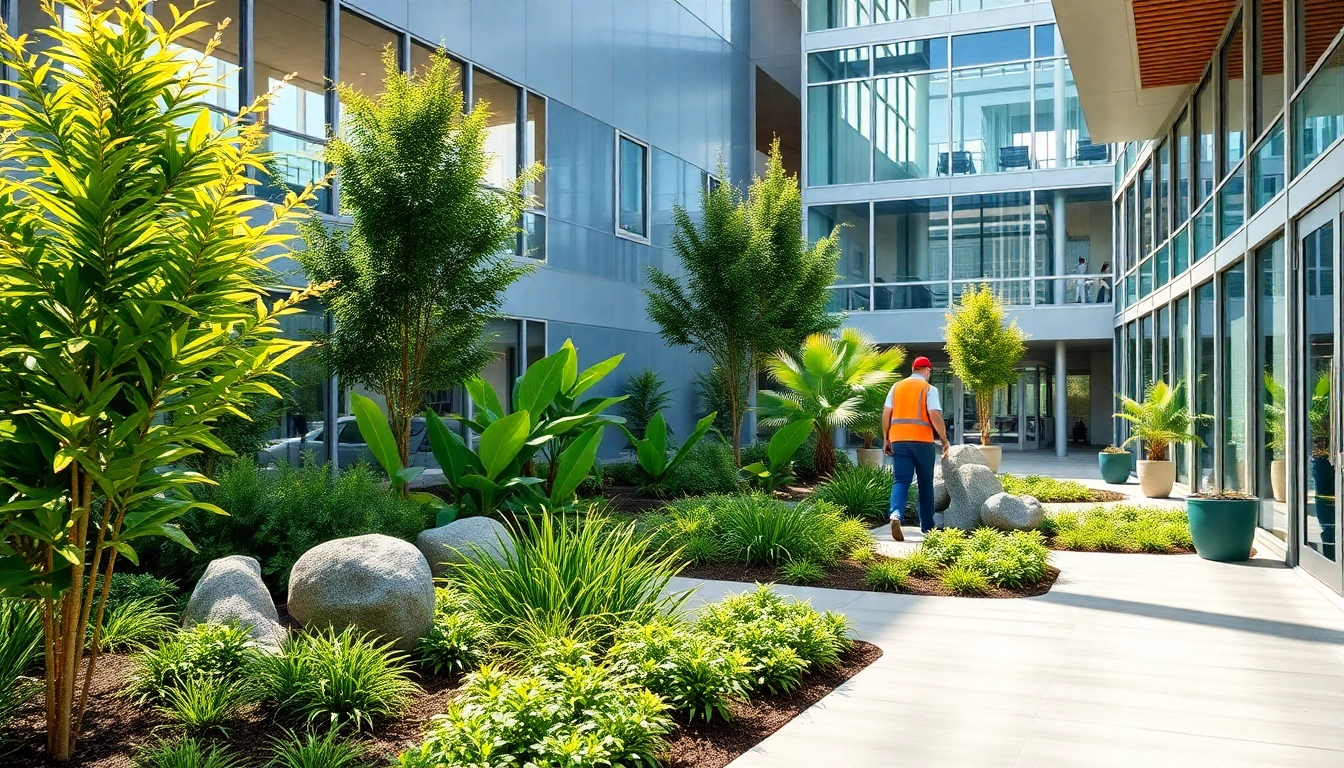Understanding the Role of Commercial Landscaping Contractors
In the contemporary business environment, the importance of aesthetics and functionality in commercial outdoor spaces cannot be overstated. Commercial landscaping contractors play a pivotal role in transforming these spaces into landscapes that not only attract customers but also create a welcoming atmosphere for employees and visitors alike.
What Do Commercial Landscaping Contractors Do?
Commercial landscaping contractors are specialized professionals who manage the design, installation, and maintenance of outdoor spaces for businesses. Their services often encompass a wide array of tasks, which include:
- Creating landscape designs tailored to client visions and business needs.
- Implementing maintenance programs that ensure the health and aesthetic appeal of plants and lawns.
- Installing irrigation systems that optimize water usage and support sustainable practices.
- Providing hardscaping services, including the installation of pathways, patios, and retaining walls.
- Maintaining seasonal plantings and seasonal decorations to enhance curb appeal.
Benefits of Hiring Professional Contractors
Engaging commercial landscaping contractors brings numerous advantages:
- Expertise: These professionals possess specialized knowledge about plants, design principles, and the local climate, ensuring that the landscapes they create are optimally suited to the environment.
- Time Efficiency: Business owners can focus on their core activities while contractors handle the extensive work involved in landscaping.
- Cost-Effectiveness: While hiring a contractor entails upfront costs, it can save money in the long term by reducing the possibility of mistakes and inefficiencies.
- Improved Property Value: Professionally landscaped properties often have higher market values and become attractive to potential buyers or tenants.
Key Skills of Successful Landscaping Contractors
Successful commercial landscaping contractors possess a unique blend of skills, including:
- Design Ability: They must have a strong artistic vision paired with practical knowledge of horticulture.
- Project Management: Effective organization, planning, and executing projects within timelines and budgets are critical.
- Technical Proficiency: Familiarity with equipment, tools, and techniques used in landscaping ensures quality work.
- Communication Skills: Clear communication with clients, vendors, and crews promotes successful project execution.
- Problem-Solving: The ability to address unforeseen challenges quickly and efficiently is crucial in maintaining project momentum.
Essential Services Offered by Commercial Landscaping Contractors
Commercial landscaping contractors provide a comprehensive suite of services designed to enhance and maintain outdoor environments. This section explores some of the essential services they offer.
Landscape Design and Planning
The foundation of any landscaping project begins with strong design and planning. Contractors assess the site, understand client needs, and outline a vision that incorporates both practical requirements and aesthetic preferences. Key components include:
- Site Analysis: Evaluating soil, sunlight, drainage, and accessibility to determine the best landscaping options.
- Conceptual Design: Creating detailed designs that illustrate the layout of plants, features, and hardscapes.
- Material Selection: Choosing plants and materials that complement the site’s specific conditions and aesthetic goals.
Lawn Care and Maintenance
To keep commercial lawns looking their best throughout the year, routine care and maintenance are vital. Services offered include:
- Regular Mowing: Keeping grass at an optimal height to promote health and curb appeal.
- Fertilization: Providing essential nutrients tailored to the lawn’s specific needs and soil type.
- Pest and Weed Control: Implementing strategies to manage unwanted pests and invasive weeds that can harm the landscape.
Seasonal Planting and Irrigation Solutions
The changing seasons affect plant growth and landscape aesthetics. Contractors offer services to ensure the landscape remains dynamic and vibrant, including:
- Seasonal Flower Planting: Selecting and planting seasonal flowers that add color and seasonal interest.
- Irrigation System Installation: Designing and installing efficient irrigation systems that lower water usage and improve sustainability.
- Seasonal Cleanups: Preparing landscapes for seasonal changes, including fall leaf removal and spring cleanups.
Choosing the Right Commercial Landscaping Contractor
Selecting the right commercial landscaping contractor can significantly influence the success of your landscaping project. Here are essential considerations when making this critical decision.
Factors to Consider When Hiring
When seeking a landscaping contractor, evaluate the following factors:
- Reputation: Research online reviews and ask for references to ensure reliability and quality of work.
- Experience: Look for contractors with a proven track record in commercial landscaping projects similar to yours.
- Licensing and Insurance: Confirm that the contractor possesses the necessary licenses and insurance to protect you from liability.
- Pricing Structure: Understand their pricing and whether they provide transparent estimates with no hidden fees.
Questions to Ask Potential Contractors
Before hiring a contractor, it’s essential to gather information that will help make an informed decision. Key questions include:
- Can you provide a portfolio showcasing previous work similar to my project?
- What is your process for communicating with clients throughout the project?
- Will you handle all aspects of the landscaping, including design, installation, and maintenance?
- What is your timeline for completing this type of project?
- Do you offer any warranties or guarantees for your work?
Evaluating Contractor Portfolios and References
Reviewing a contractor’s portfolio allows you to assess their style and quality of work. Additionally, contacting previous clients can provide insights into:
- The contractor’s ability to meet deadlines and stay within budget.
- The professionalism and communication level exhibited during the project.
- Overall satisfaction with the completed work and any recurring issues that arose post-project.
Best Practices for Managing Commercial Landscaping Projects
Effective management is key to the success of any landscaping project. Here are best practices that ensure projects run smoothly and deliver quality results.
Budgeting and Cost Management
Developing a comprehensive budget is crucial for staying on track financially. This involves:
- Forecasting costs for labor, materials, and unexpected expenses.
- Allocating funds wisely based on project phases and priorities.
- Regularly reviewing expenses versus budget to identify any areas where adjustments may be needed.
Setting Project Timelines and Milestones
A clear timeline with established milestones helps in tracking progress and ensuring accountability. This includes:
- Defining project phases and establishing completion dates.
- Creating a timeline that includes potential weather delays or seasonal considerations.
- Regularly communicating timelines to all stakeholders involved for transparency.
Communication Tips for Successful Collaboration
Effective communication is the cornerstone of successful project management. Strategies to enhance communication include:
- Establishing a primary point of contact between the contractor and the business.
- Organizing regular check-ins to discuss project updates, challenges, and feedback.
- Using digital tools for project management and updates, ensuring everyone stays informed.
Trends in Commercial Landscaping for Business Environments
As businesses evolve, so too do their landscaping needs. Here are emerging trends in commercial landscaping that are shaping outdoor environments.
Incorporating Sustainable Practices
Sustainability is not just a trend; it’s becoming a necessity in commercial landscaping. Strategies to incorporate sustainability include:
- Using native plants that require less water and maintenance while promoting local biodiversity.
- Implementing green roofs and walls to improve insulation, reduce energy costs, and enhance air quality.
- Installing rain gardens and permeable pavements that manage stormwater effectively and reduce runoff.
Utilizing Technology in Landscaping Design
Technology is revolutionizing landscape design and management. Innovations include:
- 3D modeling software that creates realistic landscape visualizations.
- Drone technology for surveying large properties and monitoring plant health.
- Smart irrigation systems that adjust water use based on weather conditions and soil moisture levels.
Creating Functional and Aesthetic Outdoor Spaces
Businesses are increasingly seeking designs that not only look good but are also functional. This involves:
- Designing multi-functional outdoor spaces that can serve as gathering areas, relaxation spots, or event venues.
- Incorporating seating areas, shade structures, and pathways that encourage interaction and usability.
- Using landscaping to create defined spaces for specific purposes, enhancing both aesthetics and function.



